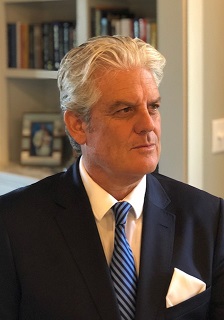From the CEO – January 2022
 Dear Clients,
Dear Clients,
Much of the world is captivated by discourse surrounding the scope of various inflationary pressures, the root causes, and what might be done (by central banks) in order to return price increases to pre-pandemic levels. We are now at a point where some of the effects of inflation are spilling over into the realm of political risk.
After insisting last year that higher prices were ‘transitory,’ the Federal Reserve now looks set to address inflation in a more aggressive manner, with the outlook for at least three rate adjustments beginning next month. Some have even suggested seven upward moves in the policy rate could be possible, coinciding with the remaining meetings this year. Of course, the tightening move isn’t shared by all central banks, with the ECB – along with some country central banks, such as that in the Philippines – hoping to avoid hikes in the face of more tame price data.
The fleeting nature of inflation still has some currency, however, with very reasonable arguments being made to suggest that prices will moderate over the course of 2022 given lower government spending in the US, declining household savings (especially among low income families), higher borrowing costs and slowing foreign demand (cf., China). Investors also see prices easing over the year with the so-called ’10-year break-even rate’ seeing inflation moderate to about 2.5% (yoy), with the two-year measure suggesting a 3% average over the next couple of years.
But this is forward looking, and it offers little solace to the immediate impact of higher prices, especially as it is now presenting itself as a variety of political risks. Protests and strike action throughout developed and emerging markets are far more common than a few years ago. All our relevant ICRG indicators have reflected these developments. Kazakhstan’s recent turmoil has been blamed on rising prices (in the wake of fuel subsidies being removed). We see the same in parts of Africa, the Middle East (Iran) and among segments of the French workforce to name a few examples. Similar events – although much tamer – will spread to the US and other Western democracies.
The stronger USD that has appeared over the past weeks increases borrowing costs for those countries funding their consumption in the greenback and has led central banks to impose capital controls to preserve foreign exchange reserves (Argentina, Turkey, for e.g.).
Of course, none of this is new: inflation and debt were regular features of business and investment in the 1970s (and before) and underscored many emerging market crises before the mid- to late-1990s. We just haven’t seen costs rise as quickly for decades. Via governments, the pandemic added considerable liquidity to the world economy, juicing asset prices all the while creating supply constraints. Most countries can’t issue paper in their local currency. We tend of have short memories or careers that haven’t spanned decades!
Given the connection between inflation, political risk and asset prices, I’m reminded of a recent study that was conducted by Campbell Harvey and Geert Bekaert (et al) that looked at the relationship between sovereign spreads and political risk. Using our ICRG risk metrics – the authors mentioned the indicators were useful since they measured ‘pure’ political risk and avoided the ‘double counting’ inherent in country risk – and looking at monthly bond yields for 43 sovereign issuers from January 1994 to December 2013 from JP Morgan’s Emerging Market Bond Indices (EMBI), the authors found that political risk is indeed the most important economic driver of sovereign spreads, explaining about 30% of the predicted variance. (https://bit.ly/3Law7ZR)
There’s more to this study than this finding, but it is instructive as asset prices begin to reflect a new cost of capital and overall valuations – with political risk being one of the fundamental building blocks of yield – return to the place they traditionally occupied.
* * *
Turning to the ICRG ratings for January, some regional notables stand out. In the Americas, Chile’s president-elect Gabriel Boric won the contest with 55% of the vote and – given his lefty credentials and worries by the investment community – appointed a former central bank governor to the finance post. Boric faces a divided legislature, however, so further concessions – to both the right and the left – will be forthcoming.
In Western Europe, France’s economy posted a half-century growth record in 2021, as President Macron remains the presidential favorite in the April balloting. Inflation is a problem, though, driven by the base effect and higher energy prices. And in Italy, political stability got a small shot in the arm as legislators re-elected President Mattarella to another term in office. The yield on the Italian 10-year note fell with the news. Inter-party tensions will persist.
In Eastern Europe, not surprisingly, yields on Russian corporate and sovereign paper are up but the ruble has begun to claw back some of its losses as the situation over a possible invasion of Ukraine continues to evolve. The central bank has suspended FX purchases, and inflation sits at a five-year high.
Burkina Faso’s recent military coup underscores tensions within the country’s security forces and the vitality of Islamist groups in the Sahel. ICRG’s metrics warned of the eventual coup last November. Speaking of coups, following the government overthrow last summer, Guinea has announced the formation of an 80-member council to act as a legislature until elections are held. The body is reportedly led by prominent civil society/elections experts.
In Asia, a continuing showdown over the candidature of Marcos Jr has added to political risk in the Philippines, and Taiwan’s legislature just passed a larger defense budget in the face of the looming threat of Chinese intervention.
Finally, in the Middle East, Algeria has signed a weapons deal with Israel amidst tensions with Morocco. And the approval rating of Turkey’s Erdogan has finally fallen below that of his political rivals as inflation hits plus 40% (yoy) and the country’s stats chief got the hook over the reported numbers.
* * *
We have received considerable demand for our recently-released new addition to our popular Researchers’ Dataset series – one that offers clients a more granular look at the political risk components of the ICRG, supported by 20 years of monthly data. The new series works as an excellent complement to the other data bundles announced this year affecting ESG, corruption, and internal/external conflict. Scores of academic studies have been conducted using these series, providing unique insights into asset volatility, government responses to the pandemic, and many more. Contact us for more information.
Our new book Quid Periculum? Measuring & Managing Political Risk in an Age of Uncertainty, co-edited and co-authored by Peter Marber (Harvard/Aperture Investors) is now available! The book includes such diverse topics as risk forecasting techniques, reliability measures, the impact of political risk on asset prices and sovereign debt workouts. Also featured is a special roundtable discussion by some of the world’s leading voices in the field on the future of political risk, who combine to address some of the challenges presented by globalization and COVID-19. The book will be available on Amazon shortly, too.
January was another fruitful month for new and returning clients, ranging from some of the world’s top universities to the largest institutional investors throughout the US, Europe, the UK, and the Middle East and Asia. Our data are now regularly featured in the research of the IMF, Bank for International Settlements, and various central banks, such as the Bank of Italy.
The new look of PRS is coming in March, too. Paying homage to our roots in the Hindu Arabic number system of the Renaissance period to more recently in the behavioral revolution of the late 1960s, one of our new features will be a regular podcast series, featuring interviews and discussions with some of the most distinguished practitioners and academics in the field of geopolitical risk, from such places as Saudi Arabia, Uzbekistan, the UK, and Dubai. No other podcast series will offer such depth, relevance, and intellectual sophistication. Stay tuned.
Not only is ICRG being used by some of the world’s largest technology firms, but the data are now being incorporated increasingly into the artificial intelligence/machine learning sector, with an emphasis on ESG data!
Our ICRG political risk scoring changes were very robust in January, affecting some 100 countries (of 141) and over 120 individual political risk metrics!!
ICRG and related PRS data continue to be the gold standard of all geopolitical risk data among the scholarly and research communities. For example, the question of whether a country’s natural resources jeopardize its fiscal sustainability even before ‘the first drop of oil is pumped’ was considered using our ICRG data on corruption, and several other metrics as a proxy for overall political stability. It was found that giant discoveries, mostly of oil and gas, lead to permanently higher government debt and, eventually, debt distress episodes, especially in countries with weaker political institutions and governance. (https://lnkd.in/dUP_4GbN)
Additionally, using our ICRG data, VIX data from Bloomberg, M2 from Haver (inter alia), if a country pursues more countercyclical monetary policy, viz., ‘leans more heavily against the wind’, stock markets react more negatively to inflation, especially in advanced economies. The negative relation between stock returns and inflation is particularly noticeable under inflation-targeting regimes, while stock returns pay no attention to inflation under exchange rate anchoring. (https://lnkd.in/dpsdfd4r)
Thanks for your continued support, and please contact us if we can be of any assistance.

Chief Executive

PRS INSIGHTS
Moving beyond current opinions, a seasoned look into the most pressing issues affecting geopolitical risk today.
EXPLORE INSIGHTS SUBSCRIBE TO INSIGHTS
